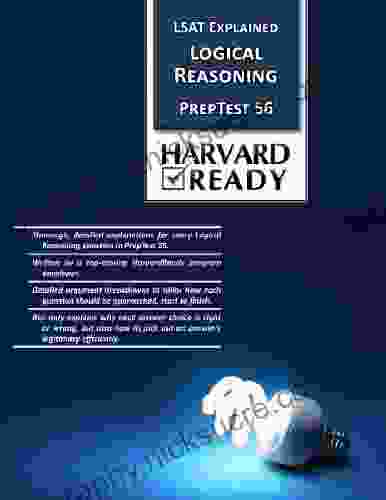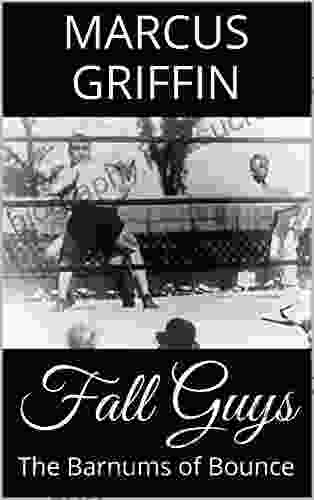Logical Reasoning Preptest 56 LSAT Explained: Logical Reasoning Preptest 20

The Logical Reasoning section of the LSAT is designed to test your ability to analyze and evaluate arguments. It is one of the most challenging sections of the test, but it is also one of the most important. A strong score on the Logical Reasoning section can help you get into the law school of your choice.
This article will provide a detailed explanation of Logical Reasoning Preptest 56 LSAT, specifically Logical Reasoning Preptest 20. We will cover the question types, strategies, and tips that you need to know in order to improve your score.
4.7 out of 5
| Language | : | English |
| File size | : | 214 KB |
| Text-to-Speech | : | Enabled |
| Screen Reader | : | Supported |
| Enhanced typesetting | : | Enabled |
| Print length | : | 41 pages |
| Lending | : | Enabled |
Matching Questions
Matching questions are a type of Logical Reasoning question that requires you to match two sets of items. The first set of items is typically a list of premises, and the second set of items is typically a list of s. Your task is to determine which follows logically from which premise.
Here is an example of a matching question:
- Premise 1: All dogs are mammals.
- Premise 2: All mammals are vertebrates.
- Premise 3: All vertebrates have a backbone.
- 1: All dogs have a backbone.
- 2: All vertebrates are dogs.
The correct answer to this question is 1. 1 follows logically from Premise 1 and Premise 2. 2 does not follow logically from any of the premises.
Assumption Questions
Assumption questions are a type of Logical Reasoning question that requires you to identify an unstated assumption that is necessary for the argument to be valid.
Here is an example of an assumption question:
Argument: The government should provide free healthcare to all citizens.
Assumption: Healthcare is a right, not a privilege.
The assumption in this argument is that healthcare is a right, not a privilege. This assumption is necessary for the argument to be valid because without it, the argument would be based on the unsubstantiated claim that everyone deserves free healthcare.
Inference Questions
Inference questions are a type of Logical Reasoning question that requires you to draw a from the information provided in the argument.
Here is an example of an inference question:
Argument: The number of students who apply to law school has increased by 10% each year for the past five years.
Inference: The number of students who apply to law school will continue to increase in the future.
The inference in this argument is that the number of students who apply to law school will continue to increase in the future. This inference is based on the assumption that the trend of the past five years will continue.
Strategies for Improving Your Logical Reasoning Score
There are a number of strategies that you can use to improve your Logical Reasoning score. Here are a few of the most effective:
- Practice, practice, practice. The more Logical Reasoning questions you practice, the better you will become at identifying question types, spotting assumptions, and drawing inferences.
- Take timed practice tests. Taking timed practice tests will help you get used to the pressure of the LSAT and learn to manage your time effectively.
- Use a process of elimination. When you are answering Logical Reasoning questions, try to eliminate the answer choices that you know are wrong. This will help you narrow down your choices and increase your chances of selecting the correct answer.
- Be aware of common logical fallacies. Logical fallacies are errors in reasoning that can lead you to incorrect s. Being aware of common logical fallacies will help you avoid making these errors in your own reasoning.
Tips for Logical Reasoning Preptest 20
Here are a few tips that you can use to help you with Logical Reasoning Preptest 20:
- Pay attention to the question type. The question type will tell you what you need to do in order to answer the question. For example, if the question type is "Matching," then you need to match the premises with the s.
- Identify the ma. The ma is the argument's main point. It is typically stated in the last sentence of the argument.
- Identify the premises. The premises are the reasons that the author gives to support the ma.
- Look for assumptions. Assumptions are unstated beliefs that the author relies on to make the argument. Assumptions are often necessary for the argument to be valid.
- Draw inferences. Inferences are s that you can draw from the information provided in the argument. Inferences are not explicitly stated in the argument, but they are implied by the information that is provided.
Logical Reasoning Preptest 56 LSAT is a challenging test, but it is also an important one. A strong score on the Logical Reasoning section can help you get into the law school of your choice. By following the strategies and tips provided in this article, you can improve your Logical Reasoning score and increase your chances of success on the LSAT.
4.7 out of 5
| Language | : | English |
| File size | : | 214 KB |
| Text-to-Speech | : | Enabled |
| Screen Reader | : | Supported |
| Enhanced typesetting | : | Enabled |
| Print length | : | 41 pages |
| Lending | : | Enabled |
Do you want to contribute by writing guest posts on this blog?
Please contact us and send us a resume of previous articles that you have written.
 Fiction
Fiction Non Fiction
Non Fiction Romance
Romance Mystery
Mystery Thriller
Thriller SciFi
SciFi Fantasy
Fantasy Horror
Horror Biography
Biography Selfhelp
Selfhelp Business
Business History
History Classics
Classics Poetry
Poetry Childrens
Childrens Young Adult
Young Adult Educational
Educational Cooking
Cooking Travel
Travel Lifestyle
Lifestyle Spirituality
Spirituality Health
Health Fitness
Fitness Technology
Technology Science
Science Arts
Arts Crafts
Crafts DIY
DIY Gardening
Gardening Petcare
Petcare Samantha Fitts
Samantha Fitts Temple West
Temple West Yang Kuang
Yang Kuang Danny Staple
Danny Staple Bagele Chilisa
Bagele Chilisa T H White
T H White Margaret Owen
Margaret Owen Nick Neely
Nick Neely Cara Koscinski
Cara Koscinski Rachel Dash
Rachel Dash Boy Scouts Of America
Boy Scouts Of America Noah Brown
Noah Brown Jim Wharton
Jim Wharton Barbara Ann Kipfer
Barbara Ann Kipfer Jim Fay
Jim Fay John Whitman
John Whitman Beebe Bahrami
Beebe Bahrami Mark Ellyatt
Mark Ellyatt Eric Leiser
Eric Leiser Jayanti Tambe
Jayanti Tambe Ralph Galeano
Ralph Galeano Brian Gilbert
Brian Gilbert Peter Wacht
Peter Wacht Barry Rabkin
Barry Rabkin Farley Mowat
Farley Mowat Bryan Peterson
Bryan Peterson Becca Anderson
Becca Anderson Daniel M Koretz
Daniel M Koretz Chiara Sparks
Chiara Sparks Nancy E Willard
Nancy E Willard Chadd Vanzanten
Chadd Vanzanten Sharon Dukett
Sharon Dukett Mike Stanton
Mike Stanton Barry Johnston
Barry Johnston Jeff Belanger
Jeff Belanger Charles Soule
Charles Soule Lawrence Baldassaro
Lawrence Baldassaro Edwin R Sherman
Edwin R Sherman Michelle Rigler
Michelle Rigler Chris Cage
Chris Cage Richard Chun
Richard Chun Vanessa Garbin
Vanessa Garbin Jaymin Eve
Jaymin Eve Thomas French
Thomas French Scott Reed
Scott Reed Mary A Fristad
Mary A Fristad R L Medina
R L Medina Julie Buxbaum
Julie Buxbaum Steve Burrows
Steve Burrows Glenna Mageau
Glenna Mageau Simon Spurrier
Simon Spurrier Suzanne Wylde
Suzanne Wylde Autumn Carpenter
Autumn Carpenter Jessica F Shumway
Jessica F Shumway David Taylor
David Taylor Richard Harris
Richard Harris Colleen Alexander Roberts
Colleen Alexander Roberts Ellen Lewin
Ellen Lewin J Bruce Brackenridge
J Bruce Brackenridge Larry Dane Brimner
Larry Dane Brimner Scarlett Thomas
Scarlett Thomas Sam Kean
Sam Kean Arny Alberts
Arny Alberts Molly E Lee
Molly E Lee Leon Mccarron
Leon Mccarron Mark H Newman
Mark H Newman Ron Lemaster
Ron Lemaster Mike High
Mike High Kara Goucher
Kara Goucher Rick Joyner
Rick Joyner Craig Martin
Craig Martin Jean Illsley Clarke
Jean Illsley Clarke Yuval Noah Harari
Yuval Noah Harari Peter K Tyson
Peter K Tyson Pat Shipman
Pat Shipman Erik J Brown
Erik J Brown Hunbatz Men
Hunbatz Men Howard Zinn
Howard Zinn Jane Hardwicke Collings
Jane Hardwicke Collings Eric Engle
Eric Engle Paul Van Lierop
Paul Van Lierop David Starbuck Smith
David Starbuck Smith Mike Loades
Mike Loades Pearson Education
Pearson Education Max Marchi
Max Marchi Stanislas Dehaene
Stanislas Dehaene Wanda Priday
Wanda Priday Hill Gates
Hill Gates Master Gamer
Master Gamer Marco Grandis
Marco Grandis Joseph Epes Brown
Joseph Epes Brown Laura Ingalls Wilder
Laura Ingalls Wilder Candice Davie
Candice Davie Timothy Pakron
Timothy Pakron Jack Andraka
Jack Andraka Joseph Schmuller
Joseph Schmuller James C Radcliffe
James C Radcliffe Ray Comfort
Ray Comfort Elliott Vandruff
Elliott Vandruff David Jamieson Bolder
David Jamieson Bolder Susan Nance
Susan Nance Jenny Chandler
Jenny Chandler Richard J Dewhurst
Richard J Dewhurst Ryan A Pedigo
Ryan A Pedigo Sam Cowen
Sam Cowen Lewis Thomas
Lewis Thomas Barbara Rogoff
Barbara Rogoff John Quick
John Quick F William Lawvere
F William Lawvere Mykel Hawke
Mykel Hawke Debra Kilby
Debra Kilby Maha Alkurdi
Maha Alkurdi Steven Hawthorne
Steven Hawthorne Barbara Taylor
Barbara Taylor Monica Hesse
Monica Hesse Shayla Black
Shayla Black Patrick Sweeney
Patrick Sweeney Catherine M Cameron
Catherine M Cameron John Kimantas
John Kimantas Jennifer Estep
Jennifer Estep S E Hinton
S E Hinton Philip Maffetone
Philip Maffetone Graham Farmelo
Graham Farmelo Violet Moller
Violet Moller David Aretha
David Aretha Robert A Baruch Bush
Robert A Baruch Bush Mike Massie
Mike Massie Kate Darling
Kate Darling William Byers
William Byers Spencer Wells
Spencer Wells Ron Avery
Ron Avery Ben Collins
Ben Collins Macauley Lord
Macauley Lord Diane Cardwell
Diane Cardwell David Abram
David Abram Sergei Urban
Sergei Urban Gary Soto
Gary Soto Stephen K Sanderson
Stephen K Sanderson Daniel S Lobel Phd
Daniel S Lobel Phd John Aldridge
John Aldridge Barzin Pakandam
Barzin Pakandam Elizabeth George Speare
Elizabeth George Speare Hongyu Guo
Hongyu Guo Dave Karczynski
Dave Karczynski Rowan Jacobsen
Rowan Jacobsen Sara Shepard
Sara Shepard Nick Townsend
Nick Townsend Cynthia Levinson
Cynthia Levinson Paul Doiron
Paul Doiron Beau Miles
Beau Miles Robin Knox Johnston
Robin Knox Johnston Tom Miller
Tom Miller David Burch
David Burch Daniel J Barrett
Daniel J Barrett Sam Harris
Sam Harris Gordon Witteveen
Gordon Witteveen Stan Tekiela
Stan Tekiela Deanna Roy
Deanna Roy Grey Owl
Grey Owl Shannon Reilly
Shannon Reilly Nicholas Sparks
Nicholas Sparks Achille Rubini
Achille Rubini Bobbie Faulkner
Bobbie Faulkner Vanessa Ogden Moss
Vanessa Ogden Moss John Henry Phillips
John Henry Phillips Oliver T Spedding
Oliver T Spedding Carlo Collodi
Carlo Collodi Beth Miller
Beth Miller Nichole Carpenter
Nichole Carpenter Debbie M Schell
Debbie M Schell Laura Pavlov
Laura Pavlov Dacher Keltner
Dacher Keltner Tim Ingold
Tim Ingold Dave Rearwin
Dave Rearwin Jonathan Bergmann
Jonathan Bergmann Anthony Edwards
Anthony Edwards Ben Sedley
Ben Sedley Titus M Kennedy
Titus M Kennedy George Macdonald
George Macdonald Basudeb Bhatta
Basudeb Bhatta Kara Tippetts
Kara Tippetts Leah Cullis
Leah Cullis Elizabeth Lockwood
Elizabeth Lockwood Jennifer Traig
Jennifer Traig T C Edge
T C Edge Linda Welters
Linda Welters Smart Reads
Smart Reads Yuki Mano
Yuki Mano Dr Craig Malkin
Dr Craig Malkin John Lister Kaye
John Lister Kaye Marc Loy
Marc Loy Edward Lee
Edward Lee Pavla Kesslerova
Pavla Kesslerova James Duthie
James Duthie Dan Golding
Dan Golding John D Barrow
John D Barrow W Scott Elliot
W Scott Elliot Lynn Mann
Lynn Mann Jay Abramson
Jay Abramson James Randi
James Randi James Syhabout
James Syhabout James Kilgo
James Kilgo Bb
Bb Graham R Gibbs
Graham R Gibbs Peter Martin
Peter Martin Suzanne Leonhard
Suzanne Leonhard Lily Collins
Lily Collins Mike Commito
Mike Commito Rachel Morgan
Rachel Morgan Visual Arts
Visual Arts Tori Day
Tori Day Barbara Neiman
Barbara Neiman Gary Lincoff
Gary Lincoff Jill Brown
Jill Brown J C Cervantes
J C Cervantes Ryan T White
Ryan T White Cary J Griffith
Cary J Griffith Melissa Gomes
Melissa Gomes Stephanie Fritz
Stephanie Fritz Stefan Ecks
Stefan Ecks Jenna Helland
Jenna Helland Robert Hogan
Robert Hogan Roy Porter
Roy Porter Gordon H Chang
Gordon H Chang Janis Keyser
Janis Keyser P J Agness
P J Agness Mia Scotland
Mia Scotland Luke Gilkerson
Luke Gilkerson Jessica Smartt
Jessica Smartt Otto Scharmer
Otto Scharmer Sampson Davis
Sampson Davis Barbara Illowsk
Barbara Illowsk Chuck Missler
Chuck Missler Linda Carroll
Linda Carroll Mackenzi Lee
Mackenzi Lee St Louis Post Dispatch
St Louis Post Dispatch Buddy Levy
Buddy Levy W Hamilton Gibson
W Hamilton Gibson Rob Pope
Rob Pope Bashir Hosseini Jafari
Bashir Hosseini Jafari Edith Grossman
Edith Grossman Erica Schultz
Erica Schultz Jude Currivan
Jude Currivan Randy Baker
Randy Baker Nadine Hays Pisani
Nadine Hays Pisani David A Bogart
David A Bogart Melissa Haag
Melissa Haag Michael Palin
Michael Palin Clayton King
Clayton King Dr Faith G Harper
Dr Faith G Harper Steven Bell
Steven Bell Thomas Bulfinch
Thomas Bulfinch Kathleen Masters
Kathleen Masters Ryan Higa
Ryan Higa Barbara Gastel
Barbara Gastel Tami Anastasia
Tami Anastasia Chase Hill
Chase Hill Babu The Panda
Babu The Panda Richard Meadows
Richard Meadows Burt L Standish
Burt L Standish Jack Newman
Jack Newman David Thomas
David Thomas Helen Kara
Helen Kara Kam Knight
Kam Knight John Garrity
John Garrity Chris Eberhart
Chris Eberhart Barry Friedman
Barry Friedman Craig Lambert
Craig Lambert V B Alekseev
V B Alekseev S K Gupta
S K Gupta Julian I Graubart
Julian I Graubart Barbara Kennard
Barbara Kennard Richard Weissbourd
Richard Weissbourd Ben Povlow
Ben Povlow Bernard Marr
Bernard Marr John C Norcross
John C Norcross Alexandra Andrews
Alexandra Andrews Matt Taddy
Matt Taddy Cheryl Erwin
Cheryl Erwin Gerald Beaudry
Gerald Beaudry Leia Stone
Leia Stone Janna Levin
Janna Levin Roanne Van Voorst
Roanne Van Voorst Jutta Schickore
Jutta Schickore Print Replica Kindle Edition
Print Replica Kindle Edition Massimo Cossu Nicola Pirina
Massimo Cossu Nicola Pirina Mike Allison
Mike Allison John J Robinson
John J Robinson James Koeper
James Koeper Kyle Butler
Kyle Butler Constanze Niedermaier
Constanze Niedermaier Sport Hour
Sport Hour J Michael Veron
J Michael Veron Rebecca Solnit
Rebecca Solnit Dan R Lynch
Dan R Lynch Barry Burd
Barry Burd Cindy Post Senning
Cindy Post Senning Mark Rashid
Mark Rashid Lock Gareth
Lock Gareth Frederick Douglass Opie
Frederick Douglass Opie Bridget Flynn Walker Phd
Bridget Flynn Walker Phd Holger Schutkowski
Holger Schutkowski Emma Brockes
Emma Brockes Victor Seow
Victor Seow Jennifer Pharr Davis
Jennifer Pharr Davis James Duggan
James Duggan William Wasserman
William Wasserman Harvey Wittenberg
Harvey Wittenberg Lynn Rosen
Lynn Rosen John G Robertson
John G Robertson Diane Musho Hamilton
Diane Musho Hamilton Mina Lebitz
Mina Lebitz Gay Robins
Gay Robins Scott Westerfeld
Scott Westerfeld Justin Sirois
Justin Sirois Rebecca Rupp
Rebecca Rupp Crystal Duffy
Crystal Duffy Emily Chappell
Emily Chappell Barbara Bassot
Barbara Bassot Charlotte Booth
Charlotte Booth Stephen J Bavolek
Stephen J Bavolek Leslie Stager
Leslie Stager Barry J Kemp
Barry J Kemp Craig Romano
Craig Romano Farzana Nayani
Farzana Nayani John Sandford
John Sandford Jeff Alt
Jeff Alt Jenn Mcallister
Jenn Mcallister Jesse Liberty
Jesse Liberty James M Collins
James M Collins Casey Watson
Casey Watson Robert Ardrey
Robert Ardrey Joshua G Shifrin
Joshua G Shifrin Helen Fisher
Helen Fisher Daniel P Huerta
Daniel P Huerta Barry Glassner
Barry Glassner Bob Holtzman
Bob Holtzman Brian Switek
Brian Switek Robin Nixon
Robin Nixon Charlotte Browne
Charlotte Browne Guy P Harrison
Guy P Harrison Monta Z Briant
Monta Z Briant Christopher L Heuertz
Christopher L Heuertz Joanna Hunt
Joanna Hunt Brandon Royal
Brandon Royal Ken Xiao
Ken Xiao Bill Milliken
Bill Milliken Benita Bensch
Benita Bensch Mark Kurlansky
Mark Kurlansky Charles River Editors
Charles River Editors Charlie Shamp
Charlie Shamp Bonnie Tsui
Bonnie Tsui Reelav Patel
Reelav Patel Ernie Morton
Ernie Morton Steven Rinella
Steven Rinella Scott Mactavish
Scott Mactavish Geert Hofstede
Geert Hofstede Denton Salle
Denton Salle Geoffrey Finch
Geoffrey Finch Reprint Edition Kindle Edition
Reprint Edition Kindle Edition Vincent Bossley
Vincent Bossley Kenton Kroker
Kenton Kroker John H Mcwhorter
John H Mcwhorter Nicholas Wolterstorff
Nicholas Wolterstorff Christine Kenneally
Christine Kenneally Jeremy Sweet
Jeremy Sweet Kate Williams
Kate Williams Martin Sternstein
Martin Sternstein Trish Kuffner
Trish Kuffner Marshall Jon Fisher
Marshall Jon Fisher Ellen Notbohm
Ellen Notbohm Susan Dennard
Susan Dennard Arnold G Nelson
Arnold G Nelson Tim Marshall
Tim Marshall Chris Bennett
Chris Bennett Erica B Marcus
Erica B Marcus Conor Nolan
Conor Nolan Dustin Hansen
Dustin Hansen Mitch Prinstein
Mitch Prinstein Fred Mitchell
Fred Mitchell Basu Shanker
Basu Shanker Charles Buist
Charles Buist David Beaupre
David Beaupre Jake Anderson
Jake Anderson Scott Malthouse
Scott Malthouse Ping Li
Ping Li Eliza Reid
Eliza Reid Rob Hutchings
Rob Hutchings Hollis Lance Liebman
Hollis Lance Liebman Nick Bollettieri
Nick Bollettieri Steve Biddulph
Steve Biddulph Khurshed Batliwala
Khurshed Batliwala Shmuel Peerless
Shmuel Peerless Lew Freedman
Lew Freedman Isabel Fonseca
Isabel Fonseca Marie Rutkoski
Marie Rutkoski Catherine Shainberg
Catherine Shainberg Mark Young
Mark Young Dr Michael P Masters
Dr Michael P Masters Linnea Dunne
Linnea Dunne Mick Conefrey
Mick Conefrey Wayne B Chandler
Wayne B Chandler Michael Wood
Michael Wood Joanne Glenn
Joanne Glenn Brad Burns
Brad Burns Emma Walker
Emma Walker Baruch Englard
Baruch Englard Kindle Edition
Kindle Edition Fabien Clavel
Fabien Clavel David Klausmeyer
David Klausmeyer Sean Mcindoe
Sean Mcindoe C R Hallpike
C R Hallpike Julie L Spencer
Julie L Spencer Rachel Smith
Rachel Smith Betty Stone
Betty Stone Richard H Immerman
Richard H Immerman Barbara Russell
Barbara Russell Prince Asare
Prince Asare Nicole Martin
Nicole Martin Proper Education Group
Proper Education Group Kit Yates
Kit Yates Blair Braverman
Blair Braverman Eddie Merrins
Eddie Merrins Toby A H Wilkinson
Toby A H Wilkinson Muhammad Zulqarnain
Muhammad Zulqarnain Mark Mayfield
Mark Mayfield Joseph Alton M D
Joseph Alton M D Tara Brach
Tara Brach Robin Mcmillan
Robin Mcmillan Jeffrey Jensen Arnett
Jeffrey Jensen Arnett Ronald Wheeler
Ronald Wheeler Thomas Lumley
Thomas Lumley Chris Mooney
Chris Mooney Editors Of Southern Living Magazine
Editors Of Southern Living Magazine Ben Goldacre
Ben Goldacre Allan V Horwitz
Allan V Horwitz Jane Butel
Jane Butel Percy Boomer
Percy Boomer Clifford Herriot
Clifford Herriot David Cockburn
David Cockburn Ascencia
Ascencia Diane Yancey
Diane Yancey Eugene V Resnick
Eugene V Resnick Richard Scott
Richard Scott Gabriyell Sarom
Gabriyell Sarom Jade Barrett
Jade Barrett Ian Leslie
Ian Leslie Beau Bradbury
Beau Bradbury Eric Franklin
Eric Franklin Rachelle Zukerman
Rachelle Zukerman Donald R Gallo
Donald R Gallo Martin Dugard
Martin Dugard Dustin Salomon
Dustin Salomon Alastair Hannay
Alastair Hannay Valerie Pollmann R
Valerie Pollmann R Karen Bush
Karen Bush William H Frey
William H Frey Malcolm Hebron
Malcolm Hebron Mike Swedenberg
Mike Swedenberg Rhonda Belle
Rhonda Belle Christopher Taylor Ma Lmft
Christopher Taylor Ma Lmft Susan Scott
Susan Scott Bruce Pascoe
Bruce Pascoe Daniel T Willingham
Daniel T Willingham Bill Mckibben
Bill Mckibben Siddhartha Rao
Siddhartha Rao Meghan L Marsac
Meghan L Marsac Rob Rains
Rob Rains Jamie Margolin
Jamie Margolin Nina Manning
Nina Manning Jen Houcek
Jen Houcek Joshua Hammer
Joshua Hammer Barbara Mertz
Barbara Mertz Barry Rhodes
Barry Rhodes Leonard M Adkins
Leonard M Adkins Jonathan Kellerman
Jonathan Kellerman Mark Twain
Mark Twain Donald Frias
Donald Frias Sam Nadler
Sam Nadler Jean Smith
Jean Smith Kenneth Wilgus Phd
Kenneth Wilgus Phd Catherine J Allen
Catherine J Allen Cait Stevenson
Cait Stevenson Breanna Hayse
Breanna Hayse
Light bulbAdvertise smarter! Our strategic ad space ensures maximum exposure. Reserve your spot today!

 Joseph HellerA Tale of Survival and Rescue: The Extraordinary Story of the Chilean Miners
Joseph HellerA Tale of Survival and Rescue: The Extraordinary Story of the Chilean Miners
 Chinua AchebeUnlocking the Enchanting World of Don Quixote: Edith Grossman's Masterful...
Chinua AchebeUnlocking the Enchanting World of Don Quixote: Edith Grossman's Masterful...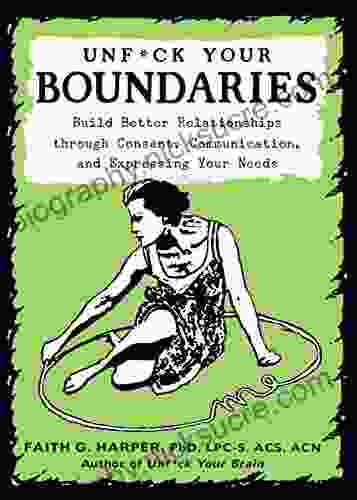
 Hunter MitchellBuild Better Relationships Through Consent Communication and Expressing Your...
Hunter MitchellBuild Better Relationships Through Consent Communication and Expressing Your... Beau CarterFollow ·13.5k
Beau CarterFollow ·13.5k E.M. ForsterFollow ·2.4k
E.M. ForsterFollow ·2.4k Billy FosterFollow ·15.1k
Billy FosterFollow ·15.1k David Foster WallaceFollow ·8.7k
David Foster WallaceFollow ·8.7k Nick TurnerFollow ·11.6k
Nick TurnerFollow ·11.6k Angelo WardFollow ·12.7k
Angelo WardFollow ·12.7k Ernest J. GainesFollow ·9.2k
Ernest J. GainesFollow ·9.2k Oliver FosterFollow ·10.6k
Oliver FosterFollow ·10.6k

 Israel Bell
Israel BellEmbark on an Epic 160-Mile Expedition for Charity on the...
Prepare yourself for an...
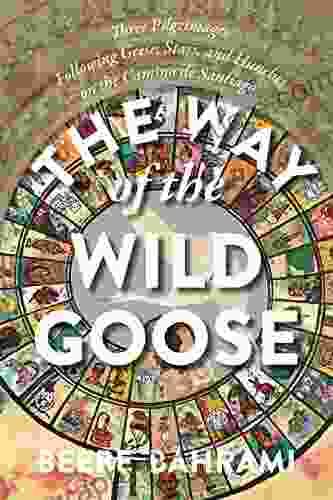
 Josh Carter
Josh CarterThe Way of the Wild Goose: A Journey of Embodied Wisdom...
The Way of the Wild Goose is an ancient...

 Allen Parker
Allen ParkerMastering the Art of Bean Fly Casting: A Comprehensive...
Fly fishing,...
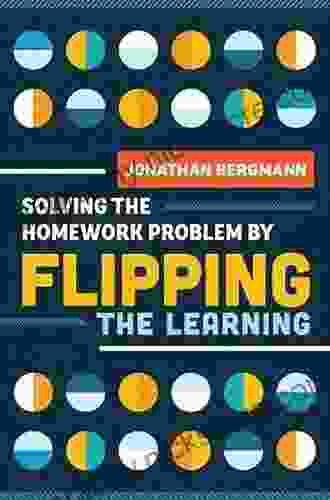
 Aaron Brooks
Aaron BrooksSolving the Homework Problem by Flipping the Learning
What is flipped...

 Fletcher Mitchell
Fletcher MitchellThe Jane Butel Library: A Renewed Source of Knowledge and...
The Jane Butel...
4.7 out of 5
| Language | : | English |
| File size | : | 214 KB |
| Text-to-Speech | : | Enabled |
| Screen Reader | : | Supported |
| Enhanced typesetting | : | Enabled |
| Print length | : | 41 pages |
| Lending | : | Enabled |


